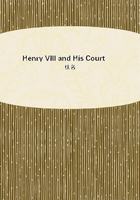
第34章 LENDEMAIN.(1)
The great lev閑 was over. Sitting beside the king on the throne, Catharine had received the congratulations of her court; and the king's smiling look, and the tender words which, in undertone, he now and then addressed to the queen, had manifested to the prudent and expert courtiers that the king was to-day just as much enamored of his young consort as he had been yesterday of his bride.
Therefore, every one exerted himself to please the queen, and to catch every look, every smile, which she let fall, like sunbeams, here and there, in order to see for whom they were intended, so that they might, perchance, by this means, divine who were to be the future favorites of the queen, and be the first to become intimate with them.
But the young queen directed her looks to no one in particular. She was friendly and smiling, yet one felt that this friendliness was constrained, this smile full of sadness. The king alone did not notice it. He was cheerful and happy, and it seemed to him, therefore, that nobody at his court could dare sigh when he, the king, was satisfied.
After the grand presentation, at which all the great and noble of the realm had passed in formal procession before the royal pair, the king had, according to the court etiquette of the time, given his hand to his consort, led her down from the throne and conducted her to the middle of the hall, in order to present to her the personages in waiting at her court.
But this walk from the throne to the centre of the hall had greatly fatigued the king; this promenade of thirty steps was for him a very unusual and troublesome performance, and the king longed to change to something else more agreeable. So he beckoned to the chief master of ceremonies, and bade him open the door leading into the dining-room. Then he ordered his "house equipage" to be brought up, and, seating himself in it with the utmost stateliness, he had the sedan kept at the queen's side, waiting impatiently till the presentation should at last conclude, and Catharine accompany him to lunch.
The announcements of the maids of honor and female attendants had been already made, and now came the gentlemen's turn.
The chief master of ceremonies read from his list the names of those cavaliers who were, henceforth, to he in waiting near the queen, and which names the king had written down with his own hand. And at each new appointment a slight expression of pleased astonishment flitted across the faces of the assembled courtiers, for it was always one of the youngest, handsomest, and most amiable lords whom the master of ceremonies had to name.
Perhaps the king proposed to play a cruel game at hazard, in surrounding his consort with the young men of his court; he wished to plunge her into the midst of danger, either to let her perish there, or, by her avoiding danger, to be able to place the unimpeachable virtue of his young wife in the clearest light.
The list had begun with the less important offices, and, ever ascending higher, they now came to positions the highest and of greatest consequence.
Still the queen's master of horse and the chamberlain had not been named, and these were without doubt the most important charges at the queen's court. For one or the other of these officers was always very near the queen. When she was in the palace, the lord of the chamber had to remain in the anteroom, and no one could approach the queen but through his mediation. To him the queen had to give her orders with regard to the schemes and pleasures of the day. He was to contrive new diversions and amusements. He had the right of joining the queen's narrow evening circle, and to stand behind the queen's chair when the royal pair, at times, desired to sup without ceremony.
This place of chief chamberlain was, therefore, a very important one; for since it confined him a large part of the day in the queen's presence, it was scarcely avoidable that the lord chamberlain should become either the confidential and attentive friend, or the malevolent and lurking enemy of the queen!
But the place of master of horse was of no less consequence. For as soon as the queen left the palace, whether on foot or in a carriage, whether to ride in the forest or to glide down the Thames in her gilded yacht, the master of horse must be ever at her side, must ever attend her. Indeed, this service was still more exclusive, still more important. For, though the queen's apartments were open to the lord chamberlain, yet, however, he was never alone with her.